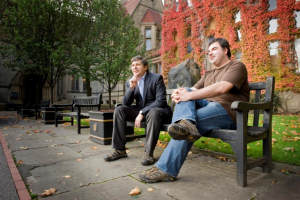Manchester professors receive their Nobel Prizes
13 Dec 2010
In a lavish ceremony in Stockholm, Sweden, Professor Andre Geim and Professor Konstantin Novoselov were awarded the 2010 Nobel Prize in Physics.

The ceremony, reward for the outstanding achievement by The University of Manchester academics, was watched by a worldwide audience.
Professors Geim and Novoselov were awarded the Prize for their discovery of graphene – the world’s thinnest material which can be used in thousands of applications.
Attended by the King and Queen of Sweden, as well as some of the world’s most eminent scientists and statesmen, the ceremony at the Stockholm Concert Hall featured a grand banquet for guests.
Earlier in the week of celebrations, both Professor Geim and Professor Novoselov had given Nobel lectures to explain how they discovered graphene.
Professor Geim’s lecture detailed his varied route across universities throughout Europe before settling at The University of Manchester in 2001, and the story of the Friday night experiments which ultimately led to the discovery.
Professor Novoselov, known universally as ‘Kostya’, then took up the tale to explain the extraordinary properties of graphene.
Professor Novoselov was Professor Geim’s PhD student, and the pair have worked closely together ever since.
One Friday evening in Manchester in 2004, they were doing one of their regular Friday night experiments – a time where they would try out often bizarre and zany techniques – by stripping tiny molecules of carbon from graphite.
Graphene is a two-dimensional layer of carbon atoms that resembles chicken wire.
Since its discovery, Professor Geim and Dr Novoselov have published numerous research papers in prestigious journals such as Science and Nature, which have demonstrated the exquisite new physics for the material and its potential in novel applications such as ultrafast transistors just one atom thick – making it a potential successor to silicon – and sensors that can detect just a single molecule of a toxic gas.
A team of materials scientists and physicists from Manchester recently reported that graphene has the potential to replace carbon fibres in high performance materials that are used to build aircraft.
And Professor Geim has now created fluorographene - a two-dimensional version of Teflon which could revolutionise hundreds of everyday objects.
The award of the Nobel Prize means there are currently four Nobel Laureates at The University of Manchester.
University of Manchester President and Vice-Chancellor Nancy Rothwell was at the ceremony to see the professors receive the prize,as was Science minister David Willets.
The University is holding an event on January 26th 2011 to celebrate the achievements of Professor Geim and Professor Novoselov.
